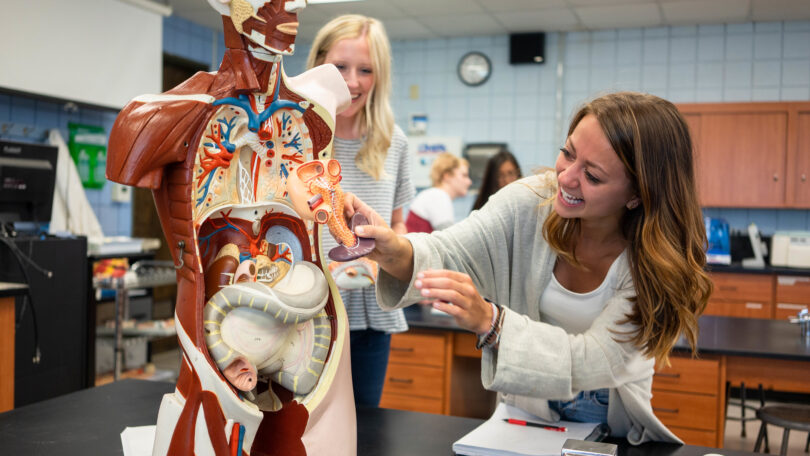Biology courses are offered to serve the needs of students in major and minor fields, as well as students in allied health and professional majors and non-science majors fulfilling general education and degree requirements. Majors will be prepared to face regional competition for employment and academic placement. In accord with the general mission of the University, courses are taught with a Christian worldview while maintaining a perspective of objective analysis and rigorously discriminating between observation and derived theories.
Students desiring certification to teach biology and/or chemistry in the secondary school are required by the Missouri Department of Elementary and Secondary Education to complete a Unified Science Core of at least 39 hours. This Unified Science certificate is designed for the beginning high school sciences (i.e., Biology I or Chemistry I).
Students who desire certification to teach advanced biology or chemistry in the secondary school are required by the Missouri Department of Elementary and Secondary Education to complete a Unified Science Core of at least 39 hours, with an additional 20 hours minimum in at least one endorsement area (Biology or Chemistry). The program requires specific courses; for details, see the Division Chair of the Natural Sciences or the Division Chair of Education.
Possible Careers
The possibilities for careers in the field of biology are endless, depending on how you plan to apply the education you have received. Career paths in biology include: research, health care, environment/conservation, education, biotechnology, forensics, politics/lobbying, business and industry, mathematics, communication, art, computer science/informatics.
Professional Degree Programs
- Medical school
- Dental school
- Veterinary school
- Podiatry school
- Chiropractic school
Research
- Graduate school – Click on “Biology-Related Fields of Study” to see available programs at accredited schools.
- Laboratory research technician
- Laboratory equipment development or sales
- Technical support for laboratory equipment or supplies
- Forensics
Animal Care
- Zookeeper
- Veterinary technician
Environment/Conservation
- Wildlife biology
- Conservation and forestry
Education
- Teaching middle school/high school
- College professor
- Educators at science or nature center
- Zoo docent
- Science writing and communication
Computer Science
- Bioinformatics
Research Opportunities
Several research opportunities exist for undergraduate students. Local companies that offer internship opportunities to students include:
- Donald Danforth Plant Science Center
- Monsanto
- Pfizer
- St. Louis Science Center Internship Opportunities(PDF)
There are several large research universities in the St. Louis area that also may hire students to work in research laboratories as research technicians or undergraduate assistants. Interested students should routinely check the human resources websites of the universities.
- Washington University – Click on “Research” in the “Job Category” tab and click “search”
- Saint Louis University – Click on “Research” in the “Job Category” tab and click “search”
- Southern Illinois University Edwardsville
Biology Minor Requirements
BIOLOGY MINOR
The student must complete at least 18 hours in Biology, with at least 6 hours of upper level courses, including the following:
BIOL 113+111 General Biology I
BIOL 123+121 General Biology II
BIOL Plant Biology
NOTE: All Biotechnology (BIOT) courses may be used as electives for the Biology major or minor.
Biology Bachelor’s Requirements
B.A. in BIOLOGY
This degree plan is recommended for students who are planning careers in areas of biology that are non-research based.
This major requires 30 hours in Biology with at least 18 hours of upper division courses.
Required Biology (BIOL) courses:
BIOL 113+111 General Biology I and Laboratory
BIOL 123+121 General Biology II and Laboratory
BIOL 323A+321A Environmental Science and Conservation with Laboratory
OR
BIOL 323B Ecology
BIOL 343+341 Genetics and Laboratory
BIOL 401 Integrating Biological Concepts
BIOL 423 Cell Biology
Biology Electives (10-11 hours; 6-7 hours upper division)
NOTE: All Biotechnology (BIOT) courses may be used as electives for the Biology major or minor.
B.S. in BIOLOGY
This degree plan is recommended for students who are planning careers in areas of biology that are research-based, including the medical professions, as well as for those seeking Missouri state teacher certification in Unified Science with an endorsement in Biology (see note below).
This major requires 30 hours in Biology with at least 18 hours of upper division courses, plus courses in chemistry, mathematics, and physics.
Required Biology (BIOL) courses (19-20 hours; 11-12 upper division):
BIOL 113+111 General Biology I and Laboratory
BIOL 123+121 General Biology II and Laboratory
BIOL 323A+321A* Environmental Science and Conservation with Laboratory
OR
BIOL 323B Ecology
BIOL 343+341 Genetics and Laboratory
BIOL 401 Integrating Biological Concepts
BIOL 423 Cell Biology
*Required for students seeking Unified Science certification.
Required Chemistry (CHEM) courses:
CHEM 133+132 General Chemistry I and Laboratory
CHEM 143+142 General Chemistry II and Laboratory
CHEM 313+312 Organic Chemistry I and Laboratory
CHEM 323+322 Organic Chemistry II and Laboratory
Required Mathematics (MATH) course:
MATH 164 Calculus I
Required Physics (PHYS) courses:
PHYS 213+211 General Physics I and Laboratory
PHYS 223+221 General Physics II and Laboratory
Biology Electives (10-11 hours; 6-7 hours upper division)
NOTE: The Bachelor of Science degree with a major in Biology is designed for students intending to continue graduate studies in biology or related fields or medical school. A recommended elective for Biology majors is BIOL 373+371 Microbiology and Laboratory.
NOTE: All Biotechnology (BIOT) courses may be used as electives for the Biology major or minor.
Recommended courses for pre-medical students:
BIOL 213+211 Anatomy and Physiology I and Laboratory
BIOL 223+221 Anatomy and Physiology II and Laboratory
BIOL 353 Embryology
BIOL 443 Advanced Human Physiology
Required courses for students seeking secondary certification in Unified Science* with an endorsement in Biology:
BIOL 213+211 Anatomy and Physiology I and Laboratory
BIOL 223+221 Anatomy and Physiology II and Laboratory
BIOL 373+371 Microbiology
*NOTE: There are additional requirements for certification both in the Unified Science core and the professional education requirements. See the Secondary Education section of this catalog and the Unified Science major for more information.
Total Hours for B.S. in Biology: 62 *
*Includes courses which may be applied toward satisfying general education and degree requirements.


